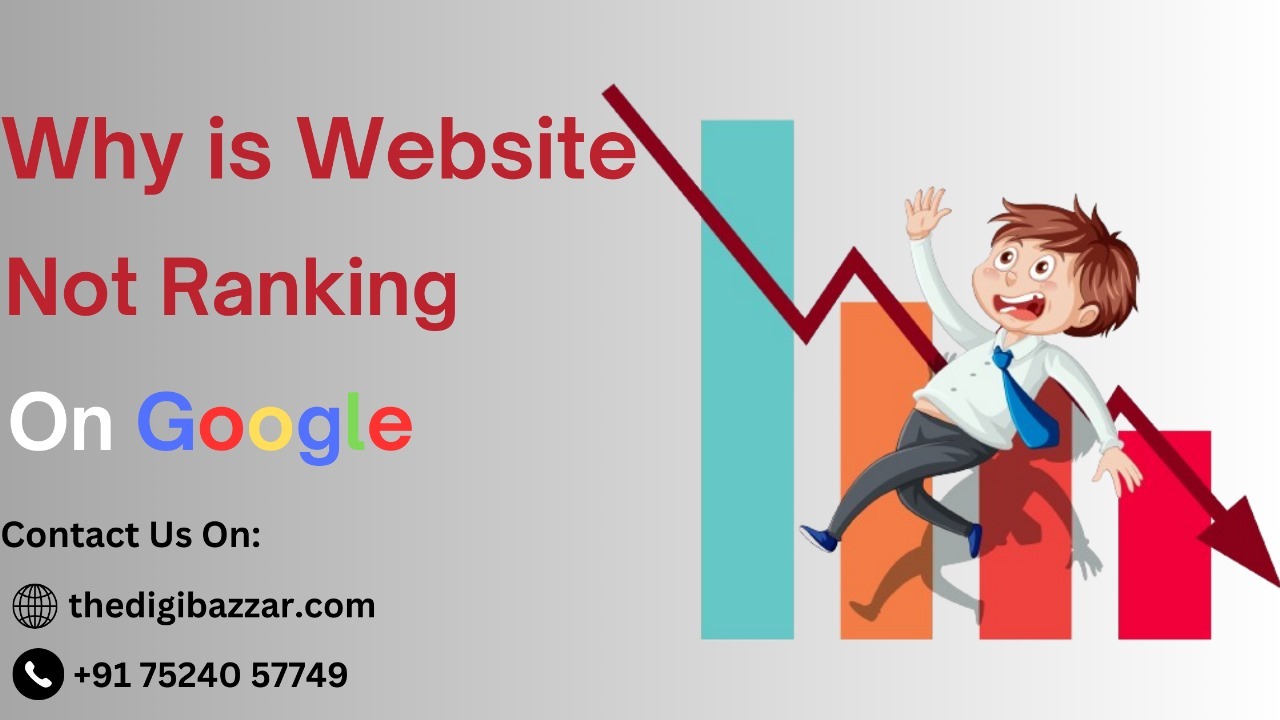Why Is Your Website Not Ranking on Google? 10 Common Mistakes and How to Fix Them
Getting your website to rank on Google can seem like a mysterious and difficult task, especially when you see your competitors sitting comfortably at the top of the search results. If you’ve been wondering, “Why is my website not ranking on Google?” you’re not alone. Many website owners struggle with this issue. Here are ten common mistakes that might be holding your site back and some actionable strategies to help you rank your website higher on google and how partnering up with the best digital marketing agency in varanasi can help you achieve your SEO goals.
Common Mistakes Stopping You From Rank Your Website on Google
1. Ignoring Keyword Research

Mistake: Not using the right keywords or failing to conduct thorough keyword research.
Solution: Use tools like Google Keyword Planner, Ahrefs, or SEMrush to identify keywords relevant to your niche. Focus on long-tail keywords and local SEO if you are targeting a specific area, like the keyword “best digital marketing agency in Varanasi.”
2. Poor Quality Content

Mistake: Publishing low-quality, thin, or duplicate content that doesn’t provide value to your audience.
Solution: Create high-quality, original content that addresses the needs and interests of your audience. Regularly update your content to keep it relevant.
3. Not Optimizing On-Page SEO

Mistake: Failing to optimize your on-page elements such as title tags, meta descriptions, headers, and images.
Solution: Ensure that each page has a unique and descriptive title tag and meta description. Use headers (H1, H2, H3) to structure your content and include your target keywords naturally.
4. Slow Website Speed

Mistake: Having a slow-loading website, which negatively impacts user experience and search rankings.
Solution: Use tools like PageSpeed Insights to analyze your website’s speed and implement recommended improvements. Optimize images, leverage browser caching, and consider using a Content Delivery Network (CDN).
5. Poor Mobile Experience

Mistake: Not having a mobile-friendly website, which can result in a poor user experience for mobile users.
Solution: Ensure your website is responsive and performs well on all devices. Use Google’s Mobile-Friendly Test to check your site’s mobile usability.
6. Ignoring Technical SEO

Mistake: Overlooking technical SEO aspects such as crawlability, site architecture, and broken links.
Solution: Perform a technical SEO audit using tools like Screaming Frog or Ahrefs. Fix any issues related to crawl errors, broken links, and ensure your site has a clear and logical structure.
7. Lack of Backlinks

Mistake: Not having enough high-quality backlinks pointing to your site.
Solution: Develop a link-building strategy to acquire backlinks from authoritative sites in your industry. Focus on creating shareable content and building relationships with influencers and bloggers.
8. Not Utilizing Local SEO

Mistake: Failing to optimize for local SEO, especially if you are targeting a specific geographical area.
Solution: Create and optimize your Google My Business listing. Encourage satisfied customers to leave positive reviews. Use local keywords in your content and meta tags, like “best digital marketing agency in Varanasi.”
9. Ignoring User Experience (UX)

Mistake: Providing a poor user experience with difficult navigation, intrusive pop-ups, or unappealing design.
Solution: Enhance the user experience by improving site navigation, ensuring a clean and attractive design, and minimizing the use of disruptive pop-ups. Make it easy for visitors to find the information they need.
10. Not Using Analytics and Data

Mistake: Failing to track and analyze your website’s performance data.
Solution: Use tools like Google Analytics and Google Search Console to monitor your site’s traffic, user behavior, and search performance. Use this data to make informed decisions and continually improve your SEO strategy.
How Can You Rank Your Website on Google
1. Conduct Thorough Keyword Research:
Conducting thorough keyword research is essential for effective SEO and digital marketing. It involves identifying the specific terms and phrases that potential customers use when searching for products, services, or information related to your business. By understanding these keywords, you can tailor your content to match user intent, improve search engine rankings, and drive targeted traffic to your website. Effective keyword research also helps uncover niche opportunities and competitive gaps, allowing you to optimize your strategy and maximize ROI.
2. Create High-Quality Content:
Creating high-quality content is vital for engaging your audience and boosting your SEO efforts. High-quality content is original, informative, and relevant, addressing the needs and interests of your target audience. It should be well-researched, well-written, and visually appealing, incorporating multimedia elements like images, videos, and infographics to enhance user experience. By providing valuable content, you can establish authority in your industry, encourage social sharing, and attract natural backlinks, all of which contribute to higher search engine rankings and sustained audience engagement.
3. Optimize On-Page SEO:
Optimizing on-page SEO involves fine-tuning individual web pages to improve their search engine rankings and attract more relevant traffic. Key elements include using targeted keywords in strategic locations like titles, headings, meta descriptions, and throughout the content. Ensuring a clean URL structure, optimizing images with alt tags, and enhancing page load speed are also critical. Additionally, internal linking helps distribute page authority and improves navigation. Effective on-page SEO aligns your content with search engine algorithms, making it easier for search engines to understand and rank your pages appropriately.
4. Improve Site Speed:
Improving site speed is crucial for enhancing user experience and search engine rankings. Faster loading times reduce bounce rates, as visitors are less likely to abandon slow-loading pages. Key strategies include optimizing images, leveraging browser caching, minimizing HTTP requests, and using a Content Delivery Network (CDN). Additionally, compressing files, reducing server response times, and optimizing CSS and JavaScript can significantly boost site speed. A faster website not only improves user satisfaction but also positively impacts SEO, as search engines prioritize sites that provide quick and seamless user experiences.
5. Enhance Mobile Usability:
Enhancing mobile usability is essential in today’s mobile-first world, where a significant portion of internet traffic comes from mobile devices. To improve mobile usability, ensure your website is fully responsive, meaning it adapts seamlessly to different screen sizes and orientations. Simplify navigation with clear menus and easy-to-click buttons. Optimize content for mobile viewing by using readable fonts, appropriate text sizes, and ample white space. Additionally, streamline forms and minimize the need for excessive scrolling or zooming. By prioritizing mobile usability, you can provide a better user experience, reduce bounce rates, and boost your search engine rankings.
6. Focus on Technical SEO:
Focusing on technical SEO is crucial for ensuring that search engines can efficiently crawl, index, and rank your website. Key aspects include optimizing your website’s architecture to make it easy for search engines to navigate. Implementing a clean and efficient URL structure, creating an XML sitemap, and using robots.txt to control crawler access are essential steps. Additionally, ensure your site is secure with HTTPS, fix broken links, and address duplicate content issues. Enhancing technical SEO helps improve site performance, ensures better crawlability, and ultimately leads to higher search engine rankings and improved visibility.
7. Build Quality Backlinks:
Building quality backlinks is a fundamental aspect of SEO that involves acquiring links from reputable and relevant websites to your own. High-quality backlinks act as endorsements, signaling to search engines that your content is valuable and trustworthy. To build these links, focus on creating exceptional content that naturally attracts links, engaging in guest blogging on authoritative sites, and forming partnerships with industry influencers. Additionally, leveraging social media and digital PR can help generate organic backlinks. Quality backlinks not only enhance your site’s authority and credibility but also improve search engine rankings and drive targeted traffic.
8. Optimize for Local SEO:
Optimizing for local SEO is essential for businesses aiming to attract customers in their geographic area. Start by claiming and optimizing your Google My Business listing, ensuring your business name, address, and phone number (NAP) are consistent across all online platforms. Incorporate local keywords in your website content, meta tags, and headings. Gather positive reviews from local customers and respond to them promptly. Additionally, create localized content and build local backlinks from community websites and directories. By focusing on local SEO, you can improve your visibility in local search results, attract nearby customers, and drive more foot traffic to your business.
9. Improve User Experience:
Improving user experience (UX) is vital for retaining visitors and encouraging engagement on your website. Start by ensuring your site has a clean, intuitive design that is easy to navigate. Optimize for fast loading times and make sure your content is easily accessible on all devices, particularly mobile. Use clear calls to action, engaging visuals, and well-structured content to guide users through your site. Additionally, gather user feedback to identify pain points and areas for improvement. A positive user experience leads to higher satisfaction, lower bounce rates, and better conversion rates, ultimately enhancing your website’s performance and SEO.
10. Utilize Analytics:
Utilizing analytics is important for understanding how users interact with your website and for making informed decisions to improve performance. Start by setting up tools like Google Analytics to track key metrics such as traffic sources, user behavior, and conversion rates. Analyze this data to identify trends, strengths, and weaknesses in your site’s performance. Use A/B testing to experiment with different strategies and measure their impact on user engagement and conversions. By leveraging analytics, you can optimize your digital marketing efforts, refine your SEO strategy, and continually enhance the user experience to achieve your business goals effectively.
Conclusion
By avoiding these common mistakes and implementing the right strategies, you can significantly increase the chances of your website rank higher on google. Remember, SEO is an ongoing process that requires consistent effort and adaptation. Stay updated with the latest trends and algorithm changes to maintain and enhance your rankings over time.
If you’re looking for professional assistance, consider reaching out to the best digital marketing agency in Varanasi to help you achieve your SEO goals and drive more traffic to your website.
